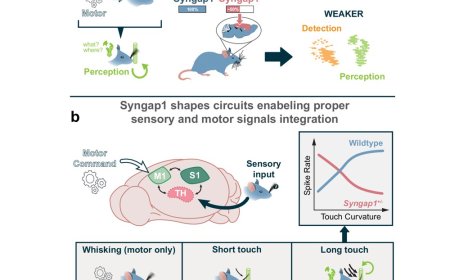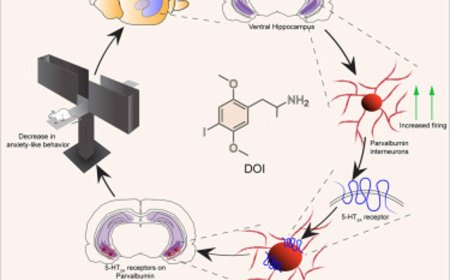Experience-dependent dopamine modulation of male aggression

Like humans, mice will compete over territory and mates, and show increased confidence in their fighting skills the more they win. At first, a brain chemical called dopamine is essential for young males to master this behavior. But as they gain experience, the chemical grows less important in promoting aggression, a new study shows.
Dopamine has been linked to male aggression for decades. How past experiences might influence this relationship, however, had until now been unclear.
In experiments in rodents, a research team boosted activity in dopamine-releasing cells in a part of the brain called the ventral tegmental area. The findings revealed that in inexperienced male fighters, this led the animals to attack for twice as long as they would have fought naturally. When the cells were blocked, the novice mice would not fight at all.
By contrast, this pattern did not hold true in males that had extensive fighting experience. Whether or not dopamine-releasing cells were boosted or blocked, the duration of attack did not change. Notably, though, the more clashes a mouse won, the more fights it would start in the future.
“Our findings offer new insight into how both ‘nature’ and ‘nurture’ shape aggression in males,” said the study senior author. “While aggression is an innate behavior, dopamine — and fighting experience — is essential for its maturation during adulthood,” added the author.
A report on the findings is publishing in the journal Nature.
Building on their evidence for the role of dopamine in learning aggression, authors set out to better understand the brain mechanisms that might explain it. To do this, the team prevented cells in the ventral tegmental area of the brain from releasing dopamine into another region called the lateral septum, a site known to regulate aggression. They found that novice males would never learn to fight, but those with previous fighting experience would continue to engage in aggressive behavior. Similarly, promoting dopamine release in this area of the brain boosted hostility in rookies but had no effect on veterans.
This suggests that the lateral septum is a key brain site for dopamine to promote “aggression learning” in rodents and likely in other mammals, including people, says the author.
The team also measured dopamine release in the lateral septum as the animals gained fighting experience. They found that the chemical surges the most on the day they first decide to attack. As the mouse becomes more experienced with fighting, this dopamine spike becomes less dramatic, supporting a central role of the chemical in initial aggression learning.
Importantly, the researchers also found that dopamine did not appear to play a similar role in female aggression. In fact, manipulating dopamine levels did not affect aggressive behaviors in female mice in any way.
According to the author, the results may offer new insight into addressing mental health conditions marked by intense shifts in mood and behavior, such as schizophrenia, bipolar disorder, and borderline personality disorder. Antipsychotic drugs that interfere with dopamine release are commonly used to treat such diseases, as well as to suppress violent behavior in psychiatric patients.
“Our results suggest that targeting dopamine may not be an effective tool when treating those with a long history of aggression,” said the author. “As a result, healthcare providers may need to consider a patient’s history, as well as their age and sex, when considering which therapy to use.”
The author adds that the results may also explain why antipsychotic drugs are known to have a stronger and longer-lasting effect in children than in adults, for whom aggression often returns once they stop receiving medication.
That said, the author cautions that while mice share similar brain chemistry with people and that the current findings echo human clinical results, more research will be needed to demonstrate the impact of past behavior on the effectiveness of antipsychotic medications in humans.













